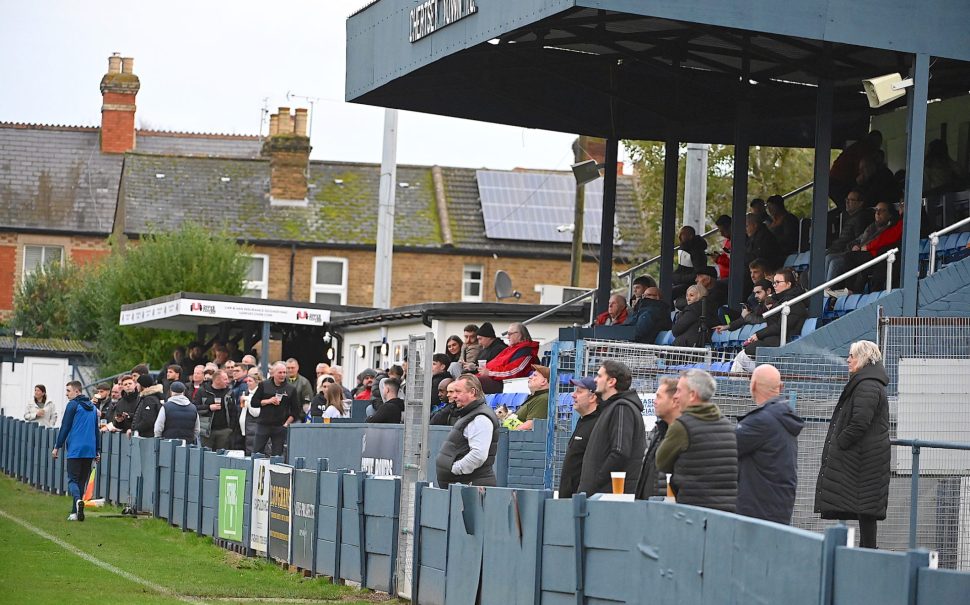More than half of UK football fans have had to attend fewer matches due to the constant increase in costs.
At the start of the 2023/24 season, a Greene King survey showed that 62% of fans had to attend fewer games to keep costs down, whilst 42% of fans had to cut costs on the money they spend on merchandise.
With season tickets reaching an all-time high, especially within London, attending football has been put on the back-burner for many, while they try to cover the cost of rent, mortgages and bills.
Since December 2020, inflation within Great Britain has reached heights it hasn’t seen in the past 12 years, peaking at 9.6% in October 2022, and gradually reducing to 4.2%.
This has massively affected spending habits, and more than three in five people (62%) have been spending less on non-essential items.
As costs remain high, people continue to struggle, especially in the English capital, with the average monthly disposable income at £500, but the average income every month is the highest in the country.
Across the whole of the UK, Cambridge is the closest to London’s £2,696 average net monthly income, at £2,469 but residents within the city have a staggering £454 more disposable cash available to them, at £954.
For football fans, it has put them in difficult positions, especially in London where there are multiple football clubs compared to Cambridge’s sole professional football club, Cambridge United.
If you supported the U’s, the average season ticket costs £407 to watch every home game in their League One campaign in 2022/23, less than half of the monthly disposable income the standard Cambridge resident earns.
Besides the cities of Liverpool, Manchester and Brighton and Hove, where nearly all the professional clubs located in the three cities play in the Premier League, football can be a decent price compared to your income.
But if you are a fan of any Premier League side in the capital, watching your club is not a cheap excursion even if it is just for one game, let alone supporting for a whole season.
The most expensive season ticket in London is at Craven Cottage, home of Fulham FC, where you can watch all 19 home Premier League games for £3,000.
That is nearly £1,000 more than Tottenham’s season tickets, who charge the second most across the entirety of the Premier League.
West Ham and Arsenal also expect fans to pay north of £1,000.
Akhil Vyas is a board member of Arsenal’s Supporters Trust (AST) and also follows the Gunners home and away, spending around £4,500 a season to support his team.
It is a price that Vyas is willing to pay.
He argued, however, that fans are a vital aspect of what makes the Premier League so entertaining, and need to be put in the forefront of decisions.
He said: “I have always said ticket pricing is too high. Ticket revenue only takes a small percentage of the overall revenue.
“With TV deals with Sky and TNT, they are spending lots of money to show football, but one of the reasons football is so popular in these stadiums is because of the chants and the atmosphere.
“Fans are a part of that. We are paying for a ticket but also creating the product and without us in the stadium, the product is far weaker.
“You will have some people who will do anything to go. They will sort out their bills and rent or mortgage, then their main expenditure after that would be Arsenal, I know a lot of people like that.
“They would rather never have a meal out because all they want to do is go to Arsenal.
“You have others who have chosen not to go because they would rather spend their money on other things that are more value for money.
“Then you have people who can’t really afford it because the transport costs are so high.”
The AST agree that asking for a reduction in ticket costs is unreasonable but are hoping that Arsenal will freeze the prices as they continue to increase.
In 2014, a ticket to watch a game at The Emirates was £44.36, compared to this season where if you wanted to watch Arsenal vs Liverpool as an adult you would have been charged at least £70.
But with Arsenal battling against the Reds and Manchester City at the top of the Premier League, it means demand is high, so tickets will be sold instantly no matter the price.
Many people are willing to pay anything to watch their team, but some aren’t or can’t, but along with people opting out of attending football matches because of the costs, others have felt disillusioned by the game.
A Football Supporters’ Association survey of nearly 10,000 fans saw 17.7% say they had fallen out of love with the game.
However, some found it difficult to move away from football, and started to watch teams lower down the pyramid or even created their own football club.
Dial Square FC was founded by Arsenal fans who were left disappointed by the way Arsenal was run and the state of professional football in general.
It is fan-owned and after founder Stuart Morgan left the club, Tony Hurley filled the vacant chairman role.
He believes that there is more to football than just the elite game.
Hurley said: “The important thing is for fans to have a voice.
“The challenge arises when fans feel as though they don’t have a voice, that’s when you end up with a ‘them and us’ situation, which is unhealthy.
“It should never be underestimated that supporters and volunteers are the lifeblood of any football club, which is why it’s paramount to consider both groups when making decisions.
“There are more financial and time constraints on families too, so it’s often easier and affordable for a family of four to watch their local non-league club as opposed to one or two going to watch a professional game, subject to the availability of tickets.
“For that reason, it’s quite common now for supporters to have an allegiance to one professional club and an affection for one non-league club.”
If you wanted to watch Dial Square FC play you could get in for free, and it allows fans to keep involved in the game without the constant worry of costs.
But along with offering a cheaper alternative to watch football, there are benefits to non-league that the Premier League and EFL games cannot offer.
Since the 2018/19 National League season there has been an increase of 74% in average attendances, and that season there were three teams that had lower average attendance than 1,000, compared to one this season.
But this interest has also spread to lower down the pyramid.
Enfield Town FC are a fan-owned club who have tried to grow their fanbase by building a community around the club.
Ram Ismail is a director at the club and also holds a season ticket at Tottenham.
He said: “A father and son can get in for £14, whereas with the two north London clubs you won’t get much change out of £150.
“The food is also cheaper and the football is real. You don’t just celebrate with your son, you celebrate with the players and manager, it is a much more close-knit level of football.
“The difference I have with the football is I will celebrate with my son and maybe a couple of the supporters around me but that is it, when you go home it is over.”
At the elite level, many fans have felt like an extra way to extract more money from an already money-driven industry but if you delve deeper down the footballing landscape there are multiple examples of fans being the heartbeat of the community and a vital part of the club’s success.
Photo credit: Dial Square FC





Join the discussion